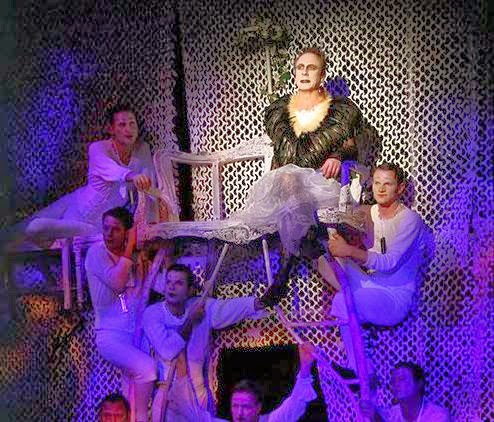In
A Midsummer Night's Dream, the lovers leave the strictures of the Athens court by entering into the wild, unrestrained forest ruled by mischievous fairies. In this space, they can unleashed their basest passions, turning love to its most animalistic form. In the forest, Helena asks Demetrius to use her as his "spaniel," to beat her as he will. The lovers fall into chaos under the effects of the flower love-in-idleness, ruled by their basest instincts as their responses turn to hysterical violence. To superimpose Freud onto the play, the lovers act as the
id only in the forest, unrestrained by the
superego. Instinct and desire alone rule the lovers in the wood.
 |
Titania (James Tucker) listing the ills in nature caused
by the fight between her and Oberon
Source: http://www.rosetheatrekingston.org/
visiting-productions/midsummer-nights-dream-propeller |
Even if the lovers are unrestrained in the forest, the forest is still ruled by the mischievous fairies who wreck havoc on the humans who stray into their domain. But in the Propeller Theatre Company's production of the comedy, the fairies don't just rule over the forest, they are an inherent part of it. On a stage largely striped of color and props, the company members are the ones who have to create the environment of the forest, melding into the setting and producing the sights and sounds of a wild landscape. Titania emphasizes the fairies' control of nature with her explanation that the row between her and her husband, Oberon, has interrupted the cycles of nature, as "hoary-headed frosts / Far in the fresh lap of the crimson rose / And on old Hiems' thin and icy crown / An odorous chaplet of summer buds / Is, as in mockery, set" (II.i). The seasons dissolve into dangerous chaos and disorder, plaguing the humans with "contagious fogs," overflowing rivers, and rotting harvests, all because of the disorder between Titania and Oberon. They become the controllers and the disrupters of the natural world.
 |
Oberon (Darrell Brochis) with the flower love-in-idleness
Source: http://www.rosetheatrekingston.org/
visiting-productions/midsummer-nights-dream-propeller |
As the "parents" of this "progeny of evils," the fairy royals and their court become essential parts of the nature of the stage. Each scene is framed by fairies observing from the sidelines. Most often, the fairy observing is Puck, laughing in delight at the disorder he creates. But some of the fairies occupy a more central space in the natural scenes. In making himself invisible, Oberon can become a more active participant in the confrontation between Demetrius and Helena, without betraying his presence. When Demetrius pushes Helena to the ground, Oberon begins to move towards Demetrius as if to defend Helena. Sensing the movement near him, Demetrius reacts to Oberon's "unseen" presence, looking through the empty air towards the fairy king's form. In a more literal instance of the fairies becoming nature on the stage, when Titania is laid to rest by her attendants, draped in a dust cloth in the middle of the stage, her sleeping form literally becomes the "dank and dirty ground" upon which Hermia rests.
 |
Puck (Joseph Chance) and the company of fairies
Source: http://propeller.org.uk/productions/
a-midsummer-nights-dream-and-the-comedy-of-errors/about-the-show |
The fairies standing on the sidelines of the stage also create the sounds of the forest scene, becoming the soundscape for the play. Reedy harmonicas, percussion instruments, and other sound effect instruments become birdsong, frogs croaking, and the wind rustling through the trees. The fairies also play a vital role in creating the disorienting sounds of the forest that drive the lovers into further confusion. Veiled behind the stage's netting, the fairies whisper around Hermia as she struggles through her nightmare, increasing the terror of her dream. Puck finds great enjoyment in ventriloquizing around Lysander and Demetrius in the darkness of the wood, drawing them towards the clearing with the sound of what they think is their enemy's voice. Thus, the sounds created by the fairies enhance the disorder of the imagined natural space, pushing the lovers into hysterics before Oberon and Puck right the havoc their magic has wrought.
 |
Puck (Joseph Chance) and Oberon (Darrell Brochis)
Source: https://secure.theatreroyalnorwich.co.uk/OnlineCATH/
default.asp?doWork::WScontent::load
Article=Load&BOparam::WScontent::loadArticle:
:article_id=EEACB47F-3B9A-47BB-AFFE-9E1CD
1818EF9&sessionlanguage=&SessionSecurity::linkName= |
After the revels of the laughable "Pyramus and Thisbe" come to an end, it seems only fitting that the fairies should enter into the controlled space of the court. The lovers charge into the natural space dominated by the fairies in Act 2, arguably wrecking as much havoc on the fairies' world as the fairies wreck on them. Puck and Oberon are the two forces of the wood who ensure that by the end of the play, "Jack shall have Jill." Let to their own devices, the lovers would have ripped each other apart, making Oberon's final intervention following Puck's mistake necessary. The natural discord Titania speaks of is mirrored by the lovers, so that, ultimately, once Oberon and Titania reconcile, the natural world can be righted and the lovers can end up where their supposed to be. The happy ending for the lovers hinges on the status of the relationship between the fairy king and queen rooted so deeply in nature. Thus, when Oberon and Titania emerge on the upper ledge of the stage, ringing the bell for midnight, their presence in the court brings natural concord into the controlled, human space, ushering the couples into their wedding chambers and blessing the issue of their consummations. The righting of nature, embodied in the rectified relationship between Titania and Oberon, allows for happy endings and the hope of new life for the lovers.




No comments:
Post a Comment